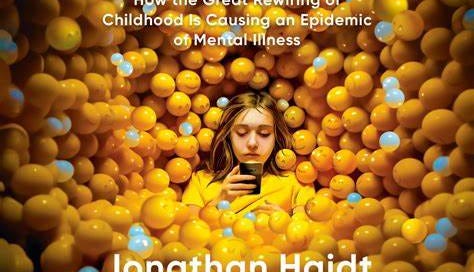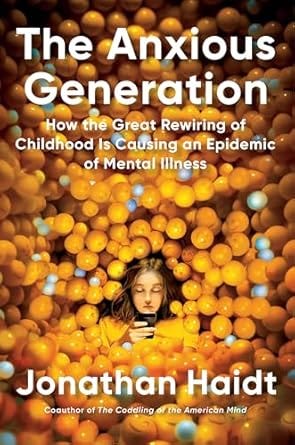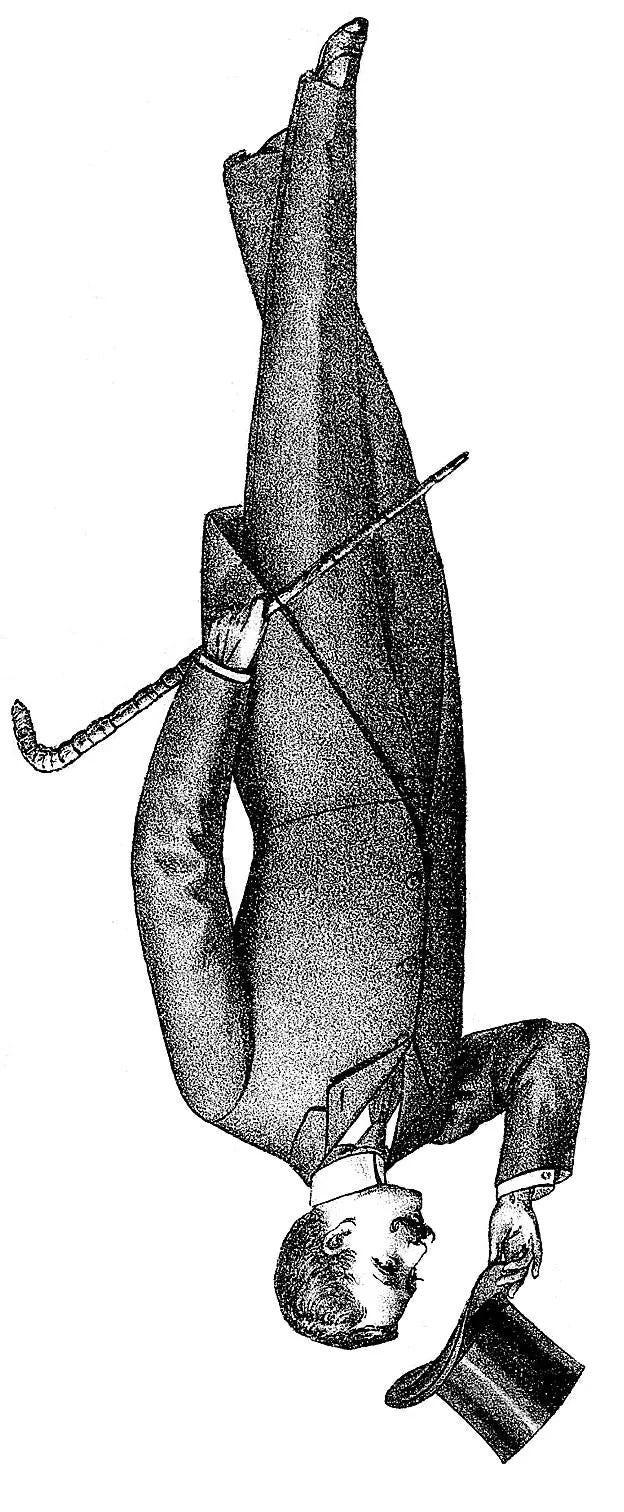Book Review: The Anxious Generation by Jonathan Haidt
This book builds on his last one, that is, parents are overprotective of their children in real life but under-protective in the digital world.
The Anxious Generation: How the Great Rewiring of Children is Causing an Epidemic of Mental Illness by Jonathan Haidt. Narrated by Sean Pratt and Jonathan Haidt. Books on Tape, 2024. 11 hours (approx.).
Children are growing up on iPads and smartphones. While there are some advantages to this there are also a number of disadvantages. In his new book, psychologist Jonathan Haidt argues that the overprotection of kids in real life coupled with the under-protection of them online is creating an epidemic of mental illness.
Haidt argues that too much time on the internet causes four “foundational” harms: social deprivation, sleep deprivation, attention fragmentation and addiction. The first two are self-explanatory - if your face is buried in a screen all day and night then you’re not socializing or sleeping.
Attention fragmentation means the child is distracted thinking about posts, comments or whatever. According to Haidt, even if smartphones are kept in a pocket or bookbag students still do less well in school. He therefore recommends keeping phones in a locker.
The addiction cycle is by the far the most interesting and scary of the harms. Companies that produce apps are intentionally using psychological tricks to get their users addicted. They do this by using the “hooked” model written about in Hooked: How to Build Habit-Forming Products by Nir Eyal. The hooked model is based on the work of B. F. Skinner in the 1940s. Skinner used a three-step process to train rats. Social media uses these same three steps - plus a fourth - to train human children (and adults, for that matter). The four steps are:
Tigger. An external trigger initiates the cycle. For example, a phone notification that someone commented on your post.
Action. The trigger creates the desire to perform an action. Using the above example, you check the comment.
Variable reward. Sometimes the action is pleasurable, but not always. Haidt says a ratio of 10:1 creates the strongest behavioral pattern. For example, the comment you checked was nice - or not.
Investment. You put a little bit of yourself into the apps you use by filling out a profile, connecting with friends and posting pictures. Once you have an investment in the app, the trigger in step one becomes internalized. Rather than needing a phone notification, you simply think, “Hey, I wonder what’s happening on…”
Theoretically, in the United States COPPA (Child Online Privacy Protection Act) is meant to help keep kids safe online - at least their data, anyway. But COPPA isn’t always enforced, and it sets the age of online “adulthood” to 13. Haidt believes that is too low. He suggests 16 at minimum. Incidentally, COPPA initially set the age at 16 but companies and civil rights groups said that would prevent children from getting information on sex and abortion, so it was lowered to the current 13. There was no science behind this, it was a political compromise.
So, what to do? First, Haidt acknowledges that kids are going to use the internet whether we like it or not, and that internet use by kids is not always a bad thing. The apps, the devices, the reasons for using the internet and other factors all play a role in whether a child should or should not go online. For example, it is perfectly fine for a child to facetime a relative overseas.
Second, Haidt lists a number of recommendations from the American Academy of Child and Adolescent Psychiatry and the government of Quebec, Canada as well as a few of his own. Some highlights include:
“Between 18 and 24 months, screen time should be limited to watching educational programming with a caregiver.
“For children 2 to 5, limit non-educational screen time to about 1 hour per weekday and 3 hours on the weekend days.
“For ages 6 and older, encourage healthy habits and limit activities that include screens […]
“Delay opening of social media accounts until 16.”
Finally, Haidt builds on the ideas put forward in his last book (with Greg Lukianoff) The Coddling of the American Mind. In that book and this one he argues that children need unsupervised play and opportunities to take risks. For example, let your child walk to school by himself or climb a tree. By overprotecting them parents make children weak and more dependent on internet play.
Haidt paints a bleak picture. I think he’s a bit too pessimistic. Other research has suggested that the internet is good for child literacy, for example. Nevertheless, the dangers are real, and Haidt does an excellent job at elucidating them.




